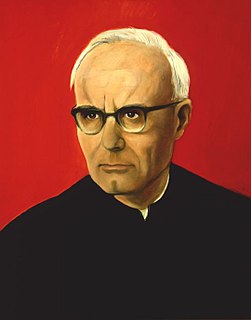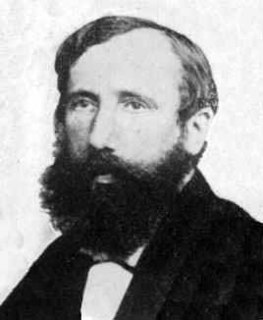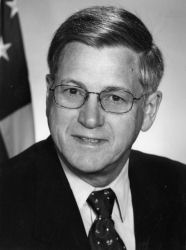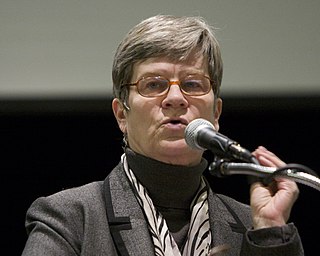Top 268 Assertion Quotes & Sayings - Page 5
Explore popular Assertion quotes.
Last updated on November 8, 2024.
Manliness has been defined as assertion of the self. Womanliness has been defined as the nurturing of selves other than our own - even if we quite lose our own in the process. (Women are supposed to find in this loss their true fulfillment.) But every individual person is born both to assert herself or himself and to act out a sympathy for others trying to find themselves - in Christian terms, meant to love one's self as one loves others ... Jesus never taught that we should split up that commandment - assigning 'love yourself' to men, 'love others' to women. But society has tried to.
Science is nothing more than a method of inquiry. The method says an assertion is valid - and will be universally accepted - only if it can be reproduced by others, and thereby independently verified. The impersonal rigor of the method has produced enormously powerful results for 400 years. The scientific method is utterly apolitical. A truth in science is verifiable whether you are black or white, male or female, old or young. It’s verifiable whether you know the experimenter, or whether you don’t.
Fathers' sharing in the birth experience can be a stimulus for men's freedom to nurture, and a sign of changing relationships between men and women. In the same way, women's freedom to give birth at home is a political decision, an assertion of determination to reclaim the experience of birth. Birth at home is about changing society.
Ironically, members on both sides of the debate do agree about one thing: big bang cosmology puts their position in jeopardy. The big bang poses a problem for young-earth creationists because it makes the universe billions of years old rather than thousands. Such an assertion undercuts their system at its foundation. Big bang cosmology also presents a problem for atheistic scientists because it points directly to the existence of a transcendent Creator - a fact they dare not concede.
Well, let’s start with the maxim that the best writing is understated, meaning it’s not full of flourishes and semaphores and tap dancing and vocabulary dumps that get in the way of the story you are telling. Once you accept that, what are you left with? You are left with the story you are telling.
The story you are telling is only as good as the information in it: things you elicit, or things you observe, that make a narrative come alive; things that support your point not just through assertion, but through example; quotes that don’t just convey information, but also personality.
The Anarchists are right in everything; in the negation of the existing order, and in the assertion that, without authority, there could not be worse violence than that of authority under existing conditions. They are mistaken only in thinking that Anarchy can be instituted by a revolution. "To establish Anarchy." "Anarchy will be instituted." But it will be instituted only by there being more and more people who do not require protection from governmental power, and by there being more and more people who will be ashamed of applying this power.
Only in love can I find you, my God. In love the gates of my soul spring open, allowing me to breathe a new air of freedom and forget my own petty self. In love my whole being streams forth out of the rigid confines of narrowness and anxious self-assertion, which make me a prisoner of my own poverty emptiness. In love all the powers of my soul flow out toward you, wanting never more to return, but to lose themselves completely in you, since by your love you are the inmost center of my heart, closer to me than I am to myself.
But innovation is more than a new method. It is a new view of the universe, as one of risk rather than of chance or of certainty. It is a new view of man's role in the universe; he creates order by taking risks. And this means that innovation, rather than being an assertion of human power, is an acceptance of human responsibility.
What has actually to be said about the Cause of everything is this. Since it is the Cause of all beings, we should posit and ascribe to it all the affirmations we make in regard to beings, and, more appropriately, we should negate all these affirmations, since It surpasses all being. Now we should not conclude that the negations are simply the opposites of the affirmations, but rather that the cause of all is considerably prior to this, beyond privations, beyond every denial, beyond every assertion.
I know not whether it would be too bold an assertion to say that candor makes capacity.... But in order to try the truth of any observation relating to the mind, the easiest method is to illustrate it by outward objects. If, for instance, a man was to sweat and labor all the days of his life to fill a chest which was already full, the absurdity of his vain endeavor would be glaring. In the same manner, when the human mind is filled and stuffed with notions brought thither by fallacious inclinations, there is no room for truth to enter: candor being banished, passions alone bear the sway.
It has been said by a distinguished philosopher that England is "usually the last to enter into the general movement of the European mind." The author of the remark probably meant to assert that a man or a system may have become famous on the continent, while we are almost ignorant of the name of the man and the claims of his system. Perhaps, however, a wider range might be given to the assertion. An exploded theory or a disadvantageous practice, like a rebel or a patriot in distress, seeks refuge on our shores to spend its last days in comfort if not in splendour.
"We hold these truths to be sacred and undeniable" in a draft of the Declaration of Independence changes it instead into an assertion of rationality. The scientific mind of Franklin drew on the scientific determinism of Isaac Newton and the analytic empiricism of David Hume and Gottfried Leibniz. In what became known as "Hume's Fork" the latters' theory distinguished between synthetic truths that describe matters of fact, and analytic truths that are self-evident by virtue of reason and definition.
Another error is an impatience of doubt and haste to assertion without due and mature suspension of judgment. For the two ways of contemplation are not unlike the two ways of action commonly spoken of by the ancients; the one plain and smooth in the beginning, and in the end impassable; the other rough and troublesome in the entrance, but after a while fair and even. So it is in contemplation; if a man will begin with certainties, he shall end in doubts; but if he will be content to begin with doubts, he shall end in certainties.
Thoughts are created in the act of writing. [It is a myth that] you must have something to say in order to write. Reality: You often need to write in order to have anything to say. Thought comes with writing, and writing may never come if it is postponed until we are satisfied that we have something to say...The assertion of write first, see what you had to say later applies to all manifestations of written language, to letters...as well as to diaries and journals
The widely accepted assertion that, only if you let markets be will everyone be paid correctly and thus fairly, according to his worth, is a myth. Only when we part with this myth and grasp the political nature of the market and the collective nature of individual productivity will we be able to build a more just society in which historical legacies and collective actions, and not just individual talents and efforts, are properly taken into account in deciding how to reward people.
The registering of doubts hath two excellent uses: the one, that it saveth philosophy from errors and falsehoods; when that which is not fully appearing is not collected into assertion, whereby error might draw error, but reserved in doubt: the other, that the entry of doubts are as so many
suckers or sponges to draw use of knowledge; insomuch as that which, if doubts had not preceded, a man should never have advised, but passed it over without note, by the suggestion and solicitation of doubts, is made to be attended and applied.
The actual assertion that the Census Bureau could behave in such a way as to tilt things one way or the other way in the partisan sense, is, on the face of it, a silly charge. It's the same Census Bureau that's considered to be incompetent by some people, and then some of the same people are saying that this incompetent agency is so clever and so Machiavellian that it can design a census for partisan reasons.
Each pursues his private interest and only his private interest; and thereby serves the private interests of all, the general interest, without willing it or knowing it. The real point is not that each individual's pursuit of his private interest promotes the totality of private interests, the general interest. One could just as well deduce from this abstract phrase that each individual reciprocally blocks the assertion of the others' interests, so that, instead of a general affirmation, this war of all against all produces a general negation.
Network news accustoms audiences to assertion not argument. Over time, it reinforces the notion that politics is about visceral identification and apposition, not complex problems and their solutions. ... sound bites aren't very helpful. They can tell a voter what a candidate believes, but not why. And many issues are too complex to be freeze dried into a slogan and a smile. ... What's lost in a world in which everything's an ad? Perhaps the country that created the assembly line has simply found a more efficient way to do politics.
Spiritual Balance is the obvious answer to the obsession that sometimes accompanies religious practice, occult practice, philosophical understandings - the assertion that one is right - that something that you're doing is better than something somebody else is doing, the way you're doing it is better than the way someone else is doing it.
The Idols of Tribe have their foundation in human nature itself, and in the tribe or race of men. For it is a false assertion that the sense of man is the measure of things. On the contrary, all perceptions as well of the sense as of the mind are according to the measure of the individual and not according to the measure of the universe. And the human understanding is like a false mirror, which, receiving rays irregularly, distorts and discolors the nature of things by mingling its own nature with it.
…there would be no powerful will binding hers in that blind persistence with which men and women believe they have a right to impose a private will upon a fellow creature…And yet she had loved him- sometimes. Often she had not. What did it matter! What could love, the unsolved mystery, count for in the face of this possession of self-assertion which she suddenly recognized as the strongest impulse of her being.
Only a law-order which holds to the primacy of God's law can bring forth true freedom, freedom for justice, truth, and godly life. Freedom as an absolute is simply an assertion of man's "right" to be his own god; this means a radical denial of God's law-order. "Freedom" thus is another name for the claim by man to divinity and autonomy. It means that man becomes his own absolute.
... In contrast to the "banality of evil," which posits that ordinary people can be responsible for the most despicable acts of cruelty and degradation of their fellows, I posit the "banality of heroism," which unfurls the banner of the heroic Everyman and Everywoman who heed the call to service to humanity when their time comes to act. When that bell rings, they will know that it rings for them. It sounds a call to uphold what is best in human nature that rises above the powerful pressures of Situation and System as the profound assertion of human dignity opposing evil.
In love at one of its poles you find the personal, and at the other the impersonal. At one you have the positive assertion — Here I am; at the other the equally strong denial — I am not. Without this ego what is love? And again, with only this ego how can love be possible?
Bondage and liberation are not antagonistic in love. For love is most free and at the same time most bound. If God were absolutely free there would be no creation. The infinite being has assumed unto himself the mystery of finitude. And in him who is love the finite and the infinite are made one.
Beware, I pray thee, of presuming that thou art saved. If thy heart be renewed, if thou shalt hate the things that thou didst once love, and love the things that thou didst once hate; if thou hast really repented; if there be a thorough change of mind in thee; if thou be born again, then hast thou reason to rejoice: but if there be no vital change, no inward godliness; if there be no love to God, no prayer, no work of the Holy Spirit, then thy saying "I am saved" is but thine own assertion, and it may delude, but it will not deliver thee.
[Bill] Binney will argue with you all day about ThinThread, but his idea was that it would collect everything about everybody but be immediately encrypted so no one could read it. Only a court could give intelligence officials the key to decrypt it. The idea was to find a kind of a compromise between [privacy rights and] the assertion that if you don't collect things as they happen, you won't have them later - because what the NSA really wants is the capability of retrospective investigation.
There must be no barriers to freedom of inquiry... There is no place for dogma in science. The scientist is free, and must be free to ask any question, to doubt any assertion, to seek for any evidence, to correct any errors. Our political life is also predicated on openness. We know that the only way to avoid error is to detect it and that the only way to detect it is to be free to inquire. And we know that as long as men are free to ask what they must, free to say what they think, free to think what they will, freedom can never be lost, and science can never regress.

























